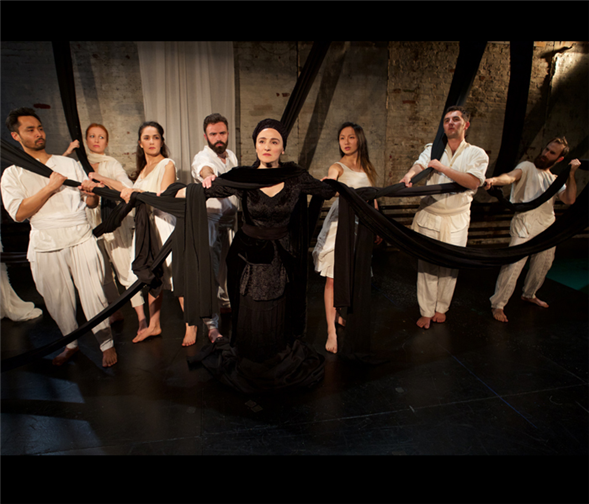Blessed Unrest partners with a theatre from Kosovo
---
Theatre artists who want to be treated like rock stars should just head to Albania. At least that's what Blessed Unrest artistic director Jessica Burr discovered when she toured her company's show
Doruntine through the Balkans in 2009. "People would stop us in the streets," she recalls. "Our original Doruntine [Zenzele Cooper], I remember people coming up to her. Not just crying, but women would take jewelry off of their bodies and give it to her."
New York audiences may not be as generous with their accessories, but they've also responded to the piece: The original run of
Doruntine sold out in 2008, and it remains Blessed Unrest's best-selling production to date. It also marked the first-ever collaboration between an American and Kosovan company, uniting the New York troupe with Theatri ODA, based in the Kosovo capital of Pristina.
The revived version is currently running at Interart Theatre through May 10, and here's an additional kicker: the play is in English and Albanian, with no subtitles.
"We don't often get to hear other people speak Albanian," says Teatri ODA co-founder Florent Mehmeti, who co-directed both versions of the show with Burr. "When you have it on stage, audiences love it because you have an Albanian audience here. There's a big community living in New York, of Albanians from all the other Albanian-speaking lands." (It's worth noting that even though Albania and Kosovo are different countries, the citizens don't always acknowledge the divide. This creates a fluid sense of who is Albanian.)
The story of
Doruntine, based on an Albanian legend by Ismail Kadare, mixes the macabre and the magical. For the theatrical version, Blessed Unrest co-founder Matt Opatrny and Teatri ODA co-founder Lirak Celaj co-wrote the script, which tells of a young woman, Doruntine, who marries an English-speaking husband and moves countries away from her childhood home. After she leaves, war breaks out, and her nine brothers are killed. Her grief-stricken mother calls out for her daughter and then, as if by magic, she appears.
The question of how Doruntine comes home is the central mystery of the play. And with the creation of this production comes another mystery: how did an off-Off-Broadway theatre make contact with an Albanian troupe? The pairing seems especially unlikely, since until 1991 Albania was under a dictatorship and completely closed off from the outside world
"In 1993, I accidentally took a boat to Albania," Burr says. Seeing the country, by then a newly formed democratic republic,and its immense poverty affected her so much that she returned in 2005 with Opatrny, her husband. That was when they stumbled onto Theatri ODA, which at the time operated out of a former bowling alley.
"All the theatre [we saw] was really bad: it was all funded by the state, and it was very nationalistic," recalls Burr. "And we showed up in Pristina one night. And it was raining and cold and we didn't want to see another show. But we knew these guys were independent: they were the first independent theatre."
Five hours later -- after much drinking and mutual admiration -- Burr, Opatrny, Mehmeti, and Celaj emerged from Theatri ODA with a promise to work together. "We gave besa to each other,"
Mehmeti says. "We were going to be a full co-production."
The concept of besa is distinctly Albanian, and it is a prominent theme in
Doruntine. A besa is an unbreakable vow, a promise that is made and kept despite all obstacles. In the play, the heroine's brother Constantin gives besa to his mother, promising to bring Doruntine home if his mother ever calls for her. The vow is so powerful that it transcends life and death, allowing the slain Constantin to rise from the grave and honor his word.
Whether on stage or in real life, such a commitment is not to be taken lightly, which is why it only took Blessed Unrest and Theatri ODA three years to create their show. They followed it up in 2012 with
The Sworn Virgin, which premiered in NYC before touring the Balkans.
The current remount is a reminder of that original meeting 10 years ago. "First of all, it's a cultural exchange of both cultures," says Mehmeti, when asked about the motives behind the collaborations. "Secondly, we want to tackle issues and themes that are quite unique, that are not seen as such in any other cultures."
Such as besa. "I think the idea of besa is very antithetical to American thinking," says Burr. "We [as Americans] think only of the individual and our value, and not so much about our value as a community. And that's largely what I love about this piece."
The lack of subtitles also defies borders. Albanian and English are divided equally throughout the show, and the actors speak both with varying degrees of proficiency. "That's unique because we can tour it to audiences that speak only English or only Albanian or both, and people can understand it," Burr says.
Asked if she has any language barriers with the piece herself, Burr quips, "I only understand parts of it. My Albanian is terrible."
---
Diep Tran is a writer and editor based in New York
Photo: The cast of Doruntine
. Photo by Alan Roche.
